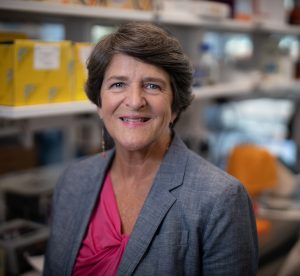
The research lab of Toni Darville, MD has studied the pathogenesis of genital tract disease due to Chlamydia trachomatis for many years. Using mouse, guinea pig, and macaque models of chlamydial infection, Dr. Darville’s research team has discovered immune signaling pathways active in disease development. They determined a role for the innate immune receptor, TLR2, in induction of pathology, and that neutrophils and IL-1 signaling pathways are key players in disease development. The Darville lab continues to pursue studies that explore host-pathogen interactions responsible for induction of disease. Her lab is using plasmid-deficient attenuated chlamydial strains that do not induce pathology but lead to induction of protective adaptive immune responses, as tools for separating pathogen-specific virulence factors from pathogen-host interactions that drive protection. The development of a chlamydial antigen-specific TCR transgenic mouse has proved to be a valuable tool to advance investigations of the adaptive T cell response to chlamydial infection with the ultimate goal to determine mechanisms to induce protective T cell memory.
Work also includes studies using blood and tissue samples obtained from women highly exposed to C. trachomatis and followed longitudinally for 12 months. Her team is examining the role of CD4+ and CD8+ T cells and antibody in protection from ascending infection and from reinfection. Genetic and transcriptional microarray studies performed in collaboration with Dr. Xiaojing Zheng (UNC) have led to the discovery of biomarkers of disease risk and protection. New studies are examining how host, pathogen, and the vaginal microbiome interact to determine infection outcome. Collaborators include Drs. Catherine O’Connell (UNC) and Xinxia Peng (NC State). This group is also using single cell RNAseq to examine blood and tissue T cell responses associated with disease or protection with high resolution.
In May 2019, Dr. Darville and her collaborators were awarded a five-year, $10.7 million grant from NIAID to establish the UNC Chlamydia Vaccine Initiative STI Cooperative Research Center. The Chlamydia Vaccine Initiative is a partnership of academic institutions and industry to explore systems-level host/pathogen molecular interactions during infection of the female genital tract by C. trachomatis and to develop a vaccine. Collaborative work with Dr. Nilu Goonetilleke (UNC) seeks to determine chlamydial proteins that induce protective CD4+ Th1 responses using blood samples collected from infected women who are followed longitudinally and remain uninfected despite ongoing unprotected sexual activity. Identified antigens are being moved forward into preclinical murine vaccine studies in collaboration with Dr. Goonetilleke and Dr. Ken Beagley at Queensland University in Brisbane, Australia. Through partnerships with the Jenner Institute at Oxford University, and BlueWillow Biologics, this team is using both replication deficient viral vectors and nanoemulsion preparations to deliver vaccine antigens to mice and guinea pigs, with the ultimate goal to take the best vaccine candidate to phase I clinical trials. Please visit the CVI’s website to learn more.
In addition to the research performed within the Darville Lab, UNC’s pediatric infectious disease faculty study many other topics across the field, including HIV, Hepatitis B and antimicrobial stewardship. Read more >>